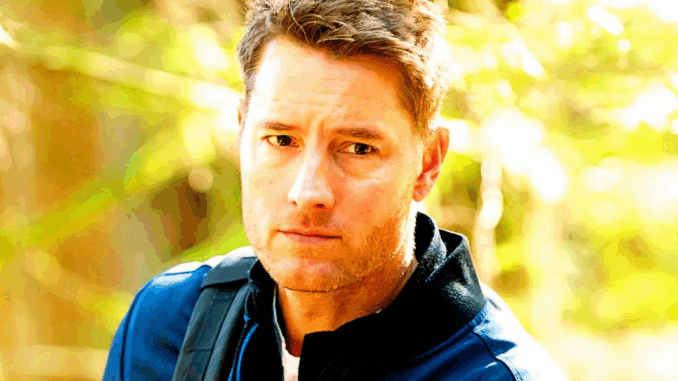
Justin Hartley has portrayed many characters throughout his acting career, but none have left as significant a mark as Kevin Pearson in This Is Us and Colter Shaw in Tracker. These two roles reveal the striking range of his talent, showcasing two men who couldn’t be more different—in background, personality, motivations, and emotional complexity. As Hartley shifts from the deeply personal family drama of This Is Us to the high-stakes investigative action of Tracker, fans are witnessing a powerful evolution in both character and performance.
A Hollywood Heartthrob vs. A Lone Wolf Survivalist
Kevin Pearson, in This Is Us, is a former sitcom star turned serious actor—a charming, emotionally wounded man born into privilege, struggling to overcome insecurity and addiction. His story is rooted in family: his complicated relationship with his siblings, his identity as a twin, and his yearning for meaning and love in the shadow of loss.
In Tracker, Colter Shaw is a completely different breed. He’s a survivalist raised off the grid, trained in critical thinking, tracking, and combat. He roams the country in an RV, solving mysteries and hunting fugitives for reward money—not out of greed, but to untangle his own moral code and past trauma. Colter is solitary, secretive, and pragmatic, often trusting his instincts over others.
Where Kevin is emotional, expressive, and yearning for belonging, Colter is calculated, reserved, and driven by justice and self-reliance.
Deep Family Ties vs. a Fractured Past
Kevin Pearson’s arc is shaped by the people around him. His father’s death, his complicated sibling dynamics, and his need to prove himself all play a central role in his journey. Family dinners, therapy sessions, and holiday gatherings are key emotional moments for Kevin, as he learns to grow from a self-centered actor into a man of depth and devotion.
Colter Shaw’s family, by contrast, is shrouded in mystery and tragedy. Raised by a paranoid genius of a father and torn apart by the suspicious death of his brother, Colter’s past is more puzzle than memory. His relationship with family is not one of reconnection, but of confrontation—with the traumas that fractured it.
While Kevin clings to his family to heal, Colter walks away from what’s left of his to survive.
Love and Vulnerability vs. Isolation and Purpose

Justin Hartley’s portrayal of Kevin in This Is Us centers heavily on vulnerability. Kevin is constantly falling in love, getting hurt, questioning his worth, and battling his demons. Hartley gave Kevin a raw emotional openness that made him relatable, even when he was at his most selfish or lost. The tears, confessions, and quiet moments made Kevin a fully dimensional character.
In Tracker, Hartley plays Colter Shaw with a cool detachment. While there are glimpses of pain beneath the surface—especially tied to his brother’s death—Colter rarely lets anyone get close. He moves from case to case, staying emotionally distant and rarely revealing anything personal. The show relies less on tears and more on tension, logic, and deduction.
This emotional shift reflects Hartley’s growing versatility. Where Kevin invites you into his heart, Colter keeps you at arm’s length.
Bright Lights vs. Gritty Landscapes
The tone and aesthetic of This Is Us and Tracker further amplify the difference. This Is Us is warm, intimate, full of soft lighting, music, and personal memories. It’s a show about family, time, and emotion. Kevin’s world is filled with suburban homes, bustling cities, and childhood flashbacks.
Tracker, on the other hand, is gritty and atmospheric. Colter lives in a mobile command center. The episodes take place in forests, deserts, warehouses, and remote corners of America. The danger is real, the pacing quick, and the emotional tone much darker.
These two environments shape the characters deeply—and Justin Hartley excels in making each man believable in his own world.
Growth in Performance: Hartley’s Expanding Range
What’s most fascinating is how these roles demonstrate Hartley’s growth as an actor. Kevin Pearson required emotional transparency—crying on cue, sharing monologues, showing both boyish charm and adult fragility. It was about honesty, emotion, and subtle growth.
Colter Shaw, meanwhile, challenges Hartley to use restraint. Colter must project intelligence and intensity while revealing very little. It’s a performance of calculated movements, body language, and control.
Rather than simply repeating the emotional beats that made Kevin so beloved, Hartley challenges himself with a role that requires stoicism, strength, and mystery.
Audience Connection: Two Types of Viewers
This Is Us drew an audience craving connection, reflection, and catharsis. Viewers related to Kevin’s mistakes, his growth, and his desire to be good. The show became a therapy session for many.
Tracker, on the other hand, appeals to fans of action, puzzles, and justice. Colter Shaw satisfies those who like stories of redemption through action rather than introspection. The connection is built through admiration of skill and courage, not emotional empathy.
Yet both shows offer powerful reflections of humanity—one through the lens of family, the other through the pursuit of truth.
Conclusion: Two Sides of the Same Talent
Justin Hartley’s transition from Kevin Pearson to Colter Shaw is not just a career move—it’s a masterclass in range. He’s shown us he can be both the emotional heart of a family and the lone wolf who brings justice to strangers. Kevin and Colter are two sides of the same coin—each shaped by loss, each seeking purpose, but in completely different ways.
As fans, we’re lucky to witness both. And whether Hartley’s next role leans toward drama or action, one thing is clear: he’s just getting started.a
